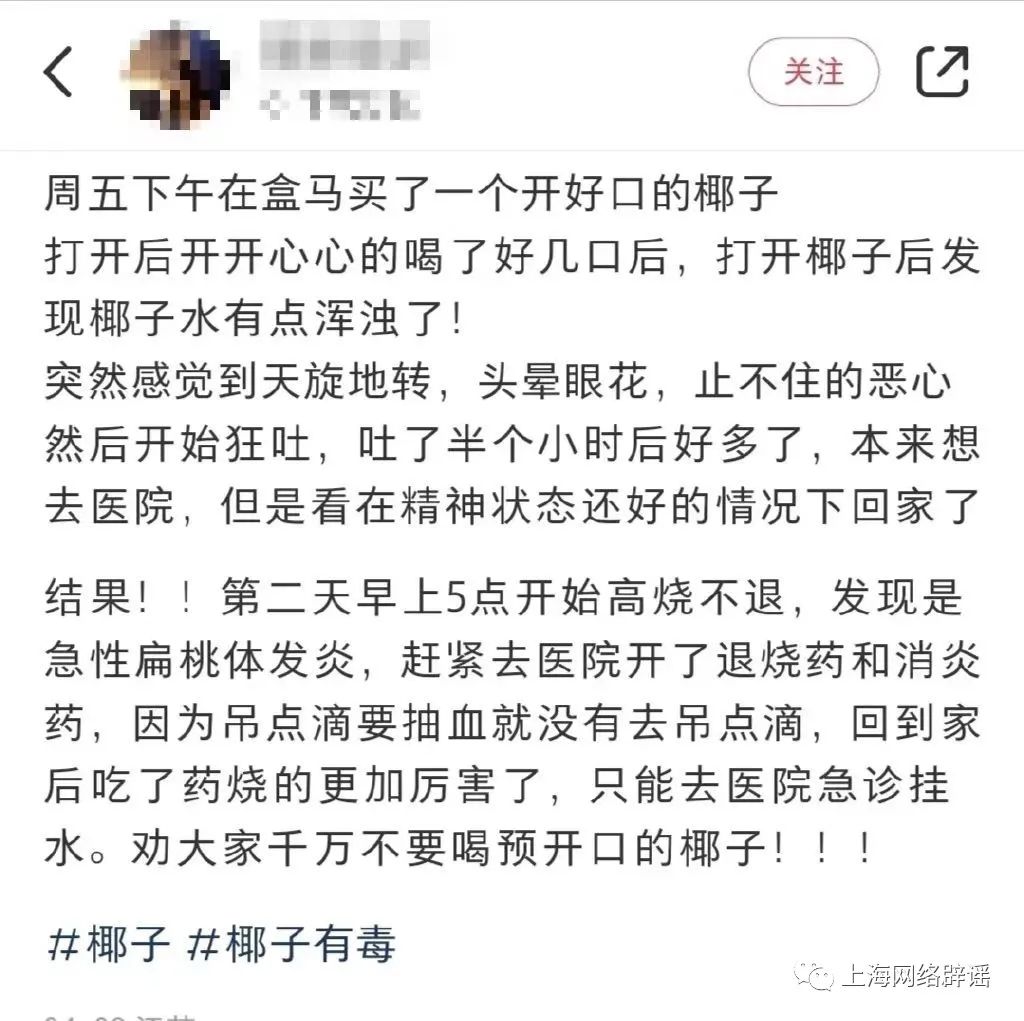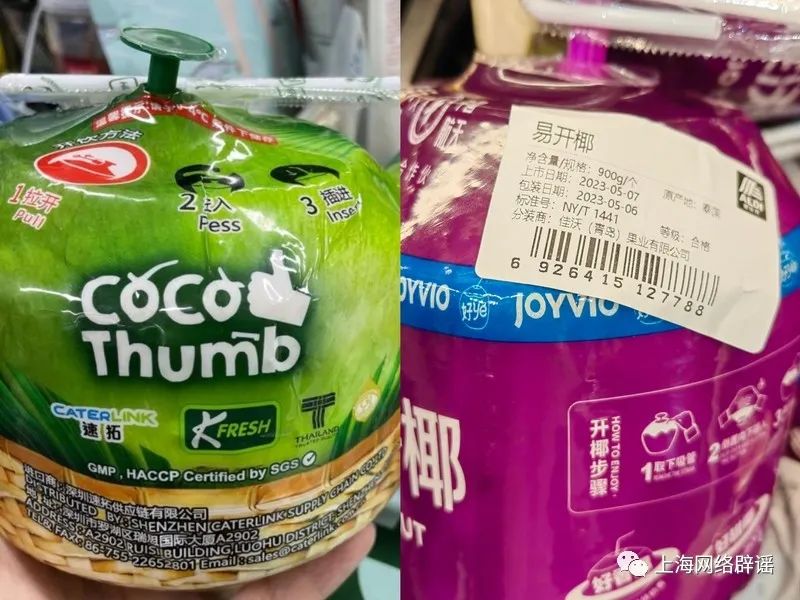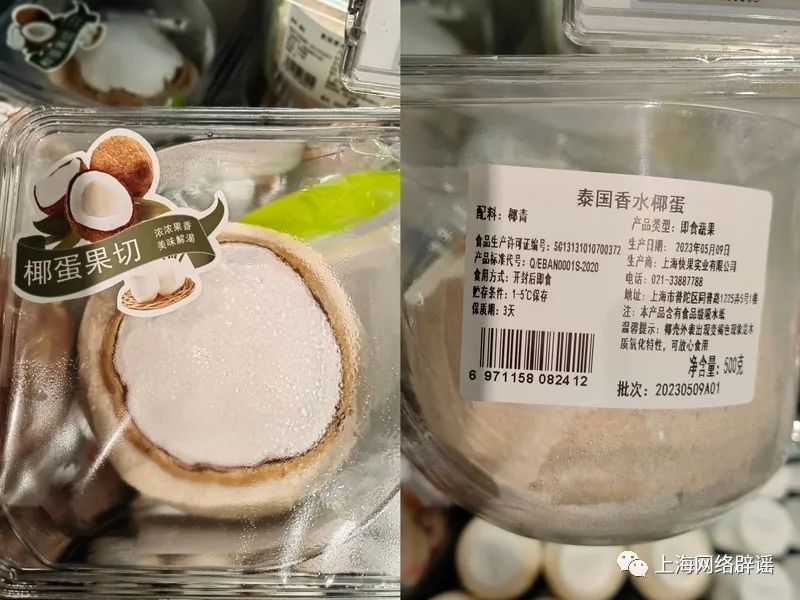Can pre-opened coconut water be drunk? The reporter visited many supermarkets and found that …
Recently, coconut water frequently boarded hot searches, and topics such as # Drinking pre-opened coconut into the emergency room # caused heated discussion among netizens. Some netizens reported that after drinking the pre-opened coconut water, they felt sick, vomited and had a high fever.


Many people say that this symptom is not unique: "My friend vomited after drinking the spoiled coconut water", "After drinking it, his head was particularly painful and his stomach turned upside down" and "the shelf life of coconut is very short, and the pre-opening is very unsanitary".

Coconut water is undoubtedly a cool and thirst-quenching product in summer. Then, can you buy pre-opened coconuts? The reporter conducted an investigation.
Why is pre-opened coconut water "poisonous"?
Pre-opened coconut refers to coconut that has been cut or drilled to facilitate drinking coconut juice. Because of its convenience, pre-opened coconut water is very popular with consumers, but coconut is easily contaminated by bacteria after pre-opening.
First of all, coconut may be polluted by unclean equipment or tools during cutting and processing;
Secondly, if the coconut is not sealed and refrigerated in time after opening, and the summer weather is hot, it is likely to lead to bacterial growth;
Thirdly, due to improper handling during transportation or storage, if the whole cold chain is not maintained or the storage time is too long, bacteria may multiply and lead to food poisoning.
A large number of staphylococcus aureus will make coconut deteriorate, which will lead to nausea, vomiting, abdominal pain, diarrhea and other symptoms after eating it by mistake; Pseudomonas cocoanum is more deadly, and spoiled coconuts stored for a long time may breed Pseudomonas cocoanum and produce a special toxin — — Rice yeast acid is harmful to important organs such as liver, kidney and heart. Horribly, even if heated to 100℃, it can’t destroy its toxicity. At present, there is no specific medicine in clinic, and the mortality rate of poisoning cases is as high as 50%. If you have suspicious symptoms, you should see a doctor immediately.
There is chaos in the pre-opening coconut market.
The reporter visited and found that at present, the pre-opened coconuts on the market have branded packaging products, and some supermarkets open their own packaging, which are sold in major supermarkets and fruit shops. But without exception, its packaging only marked the date of listing and packaging, but did not mark the shelf life.

At present, most of the pre-opened coconuts on the market only indicate the market date and packaging date, but not the shelf life.
The reporter asked how long is the shelf life of the pre-opened coconut? How to judge whether the pre-opened coconut has expired?
Many supermarket clerks used excuses such as "it doesn’t expire as long as it’s on sale" and "if it’s not fresh, we’ll take it off the shelf", but they couldn’t answer the reporter’s question directly.
Some shop assistants recommended a higher-priced "coconut egg" to the reporter, that is, a coconut with half its skin peeled. The shop assistant said that the "coconut egg" had no opening, and it was more hygienic to poke the coconut meat with a straw. The reporter saw that some "coconut eggs" were indeed marked with the date of production and shelf life (3 days), which looked more formal than pre-opened coconuts, but lacked the date of listing. The clerk couldn’t answer the question "Why are the labels of pre-packaged coconut products different?".

Some "coconut eggs" products are marked with the date of production and shelf life, but the date of listing is missing.
Fresh coconuts can be drunk directly after opening, but consumers should pay attention to pre-opened coconuts. It is recommended to choose a reliable merchant when buying pre-opened coconuts, check whether the appearance of coconuts is intact, and check the freshness of coconuts. It is best to pour coconut water out before drinking to distinguish whether it has deteriorated.
Supervision is still in a gray area.
Call for corresponding measures as soon as possible.
How to buy a safe pre-opened coconut? Is there anyone to supervise?
Li Shuguang, a professor at Fudan University School of Public Health, said that the pre-opened coconut does not belong to prepackaged foods yet, so there is no mandatory implementation of complete information labeling; However, because of the pre-opening treatment, it is not entirely within the scope of agricultural products. Prepackaged foods is managed by the State Administration of Market Supervision, while agricultural products are managed by the Ministry of Agriculture and Rural Affairs. However, due to the difficulty in defining its commodity attributes and supervision, the supervision of pre-opened coconuts is still in a gray area. It is precisely because there is no unified management that all kinds of packaging that consumers see in the market are determined by the merchants themselves, and there are indeed some security risks.
Li Shuguang called on operators to be self-disciplined and earnestly safeguard the health of consumers and the reputation of brands; Consumers should enhance their risk awareness and discrimination, and buy food in formal channels; Regulators should speed up the characterization of this kind of new formats and new foods, introduce corresponding regulatory measures as soon as possible, strengthen supervision and increase the cost of violation.
In addition, some people are worried about whether the pre-opened coconut will be added with additives. There is no ingredient list on the package, so consumers can’t check it.
Li Shuguang believes that if only a small mouth is opened on the coconut, it is difficult for merchants to add additives from it, so consumers don’t have to worry too much; If coconut water is poured out to make coconut milk, coconut jelly and other products, food additives may be added, but there are standards for the addition of additives. As long as the products meet national standards, consumers don’t have to worry about the health hazards caused by food additives.